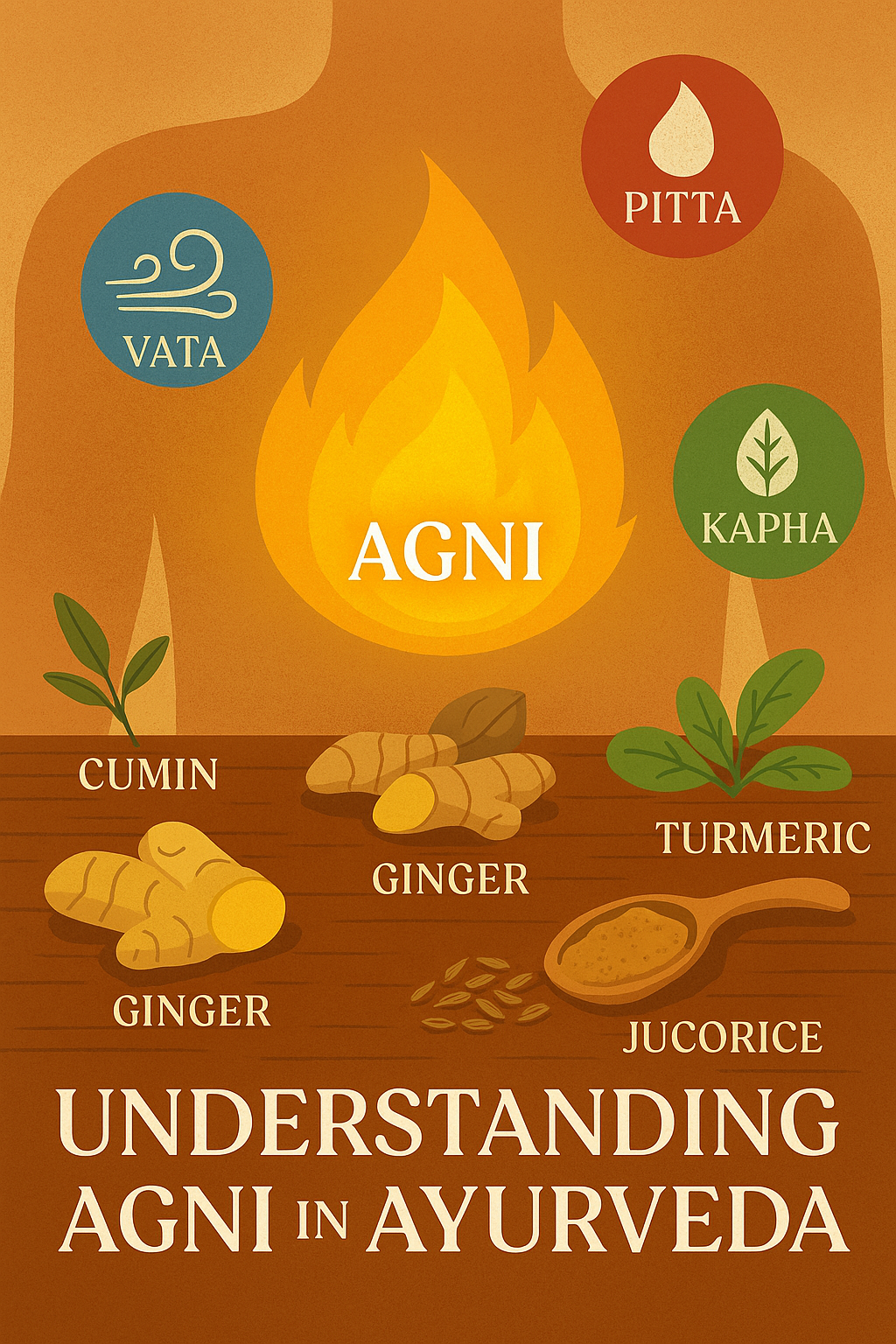Understanding Agni: The Digestive Fire That Governs Health

Agni, the Ayurvedic digestive fire, governs physical and mental transformation—supporting vitality, clarity, and balance when strong, but creating toxins (Ama) and disease when impaired.
In Ayurveda, the concept of Agni, or digestive fire, is considered one of the most vital forces for maintaining health and longevity. Far beyond just the physical act of digestion, Agni represents the transformative energy that governs not only the breakdown and assimilation of food, but also the processing of thoughts, emotions, and experiences. A well-functioning Agni supports vibrant energy, immunity, mental clarity, and emotional resilience. When Agni is disturbed, the seeds of imbalance and disease are sown.
What Is Agni?
Agni is the Sanskrit term for "fire," but in Ayurvedic physiology, it refers to the biological fire that operates within every cell and system of the body. While Jatharagni, the main digestive fire located in the stomach and small intestine, is the most well-known, there are actually 13 types of Agni:
- 1 Jatharagni – Governs primary digestion in the GI tract
- 5 Bhutagni – One for each of the five elements (ether, air, fire, water, earth), responsible for elemental transformation
- 7 Dhatvagni – One for each of the seven bodily tissues (Dhatus), governing tissue metabolism
Each form of Agni plays a role in breaking down, absorbing, and transforming substances so that the body can use them efficiently.
The Four States of Agni
Agni is dynamic—it can become balanced or disturbed depending on diet, lifestyle, emotions, environment, and constitution.
- Sama Agni (Balanced Fire): Optimal digestion, regular elimination, steady energy, and mental clarity
- Vishama Agni (Irregular Fire): Erratic digestion, common in Vata imbalance—bloating, gas, inconsistent appetite
- Tikshna Agni (Sharp Fire): Overactive digestion, typical of excess Pitta—acid reflux, hunger pangs, irritability
- Manda Agni (Slow Fire): Sluggish digestion, Kapha dominant—heaviness, lethargy, weight gain, congestion
Ayurveda aims to restore Sama Agni, recognizing it as the key to maintaining health and preventing disease.
Agni and Ama: The Root of Disease
When Agni is weak or disturbed, it fails to completely digest food, thoughts, or experiences. This leads to the accumulation of Ama—a toxic, sticky residue that clogs physical and energetic pathways. Ama is seen as the root cause of most disease in Ayurveda.
Ama manifests as:
- Coated tongue
- Foul breath or body odor
- Lethargy and heaviness
- Cloudy mind
- Chronic inflammation or congestion
By restoring Agni and eliminating Ama, Ayurveda initiates a profound detoxification and rejuvenation process.
Supporting Agni Daily
Caring for Agni is a daily practice. Here are some key lifestyle and dietary principles to support balanced digestive fire:
- Eat warm, freshly cooked foods – Avoid cold, raw, or processed meals
- Use digestive spices – Ginger, cumin, black pepper, coriander, fennel, and turmeric kindle Agni
- Eat at regular intervals – Avoid constant grazing or irregular eating patterns
- Don’t overeat – Leave 1/3 of the stomach empty to allow digestion
- Drink warm water or herbal teas – Avoid cold beverages, especially during meals
- Chew thoroughly and eat mindfully – Stimulates enzymes and awareness
Herbal Allies for Agni
Ayurveda also uses specific herbs and formulas to restore and regulate digestive fire:
- Trikatu (a blend of black pepper, long pepper, and ginger): Boosts metabolism and clears Ama
- Hingvastak churna: Alleviates gas and bloating
- Ginger (fresh or dry): Stimulates Agni, especially for Vata types
- Cumin, coriander, fennel: A classic digestive trio, often brewed as tea
These can be taken under the guidance of an Ayurvedic practitioner to tailor them to your doshic needs.
Agni and Mental Digestion
Agni is not limited to physical digestion. Ayurveda sees the mind and gut as intimately connected. Just as food needs to be digested, so do experiences, emotions, and sensory impressions. A strong mental Agni helps process emotions, let go of past traumas, and cultivate clarity.
Meditation, pranayama, journaling, and sattvic (pure) lifestyle choices enhance this subtle aspect of Agni.
Seasonal Considerations
Agni fluctuates with the seasons:
- Spring (Kapha): Agni is low—light, spicy foods recommended
- Summer (Pitta): Agni is variable—cooling, hydrating foods favored
- Autumn/Winter (Vata): Agni is stronger—warm, grounding foods best
Adjusting your diet and habits to the seasons keeps Agni stable and resilient.
Conclusion: Agni as the Flame of Life
In Ayurvedic thought, Agni is the flame of life. It determines how you digest, transform, and utilize all forms of nourishment—whether food, emotions, or experience. To protect and nurture Agni is to protect your vitality.
By honoring this internal fire through mindful eating, lifestyle alignment, seasonal adaptation, and inner stillness, we can maintain vibrant health and build a strong foundation for physical, emotional, and spiritual well-being.




